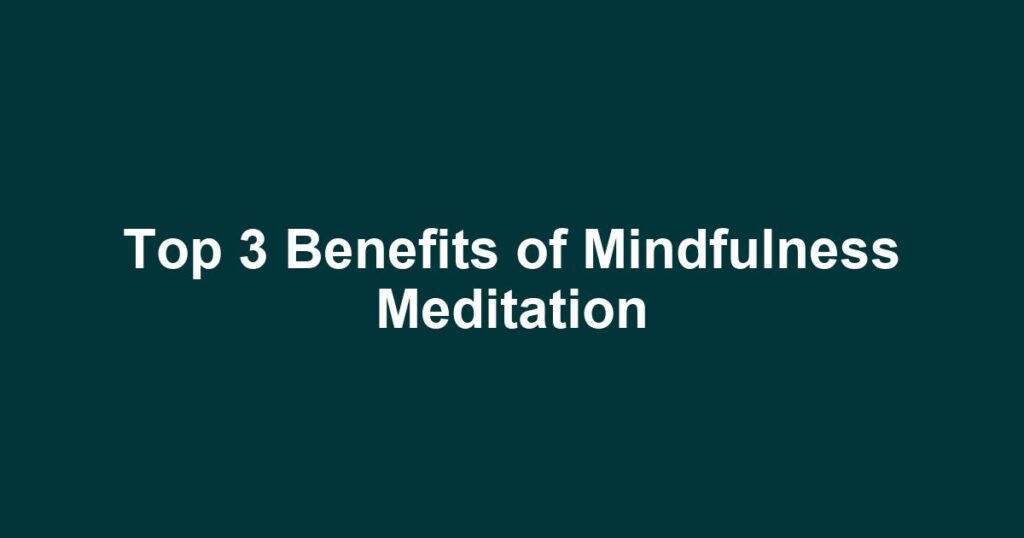Top 3 Benefits of Mindfulness Meditation
In today’s fast-paced world, the concept of mindfulness meditation has gained immense popularity as a tool for improving mental health and overall well-being. But what exactly is mindfulness meditation, and how can it benefit you?
This article explores the top three benefits of mindfulness meditation and shares practical tips on incorporating this wellness practice into your daily routine. Whether you’re a beginner or familiar with meditation, understanding these benefits can empower you to take control of your mental health and enhance your wellness practices.
What is Mindfulness Meditation?
Mindfulness meditation is a mental practice that involves focusing your attention on the present moment, acknowledging any thoughts or feelings without judgment. This technique encourages you to observe rather than react to your thoughts, promoting a deep sense of awareness and tranquility.
Benefit 1: Improved Mental Health
Reducing Anxiety and Depression
One of the most well-researched benefits of mindfulness meditation is its ability to reduce symptoms of anxiety and depression. Studies indicate that regular practice can lead to a significant decrease in stress levels, helping individuals cope more effectively with life’s challenges.
- Mindfulness meditation allows you to reduce negative thought patterns.
- It enhances emotional regulation, making it easier to manage difficult emotions.
- Research has shown a link between mindfulness practices and decreased levels of cortisol, the stress hormone.
Boosting Emotional Resilience
Mindfulness meditation fosters emotional resilience, allowing you to bounce back more quickly from stressors and difficult situations. This ability to maintain a balanced emotional state encourages a more positive outlook on life.
Benefit 2: Enhanced Focus and Concentration
Training Your Brain
When practicing mindfulness meditation, you train your brain to focus on the present moment. This enhanced concentration translates into better performance in daily tasks, whether at work, home, or school.
- Mindfulness practice can improve your attention span.
- Regular meditation increases overall cognitive flexibility.
- You may find it easier to concentrate on tasks without distractions.
Boosting Creativity
Mindfulness meditation also opens up pathways for creativity by allowing your mind to explore different perspectives. Observing your thoughts without judgment can lead to innovative ideas and solutions, particularly for those in creative fields.
Benefit 3: Physical Wellness
Improving Physical Health
While mindfulness meditation primarily focuses on mental health, its benefits extend to physical wellness as well. Engaging in this practice can lead to various positive effects on the body.
- Lower blood pressure: Mindfulness meditation has been linked to reductions in blood pressure, promoting cardiovascular health.
- Enhanced immune function: Regular practice may boost your immune system, helping your body fight illness.
- Pain management: Many individuals report reduced chronic pain levels through consistent meditation practices.
Promoting Healthy Lifestyle Choices
Mindfulness meditation encourages a deeper awareness of your habits and behaviors. As you become more aware, you may find yourself making healthier lifestyle choices, such as better eating habits and increased physical activity.
How to Start Your Mindfulness Meditation Journey
If you’re new to mindfulness meditation, getting started can seem daunting. However, it doesn’t require a lot of time or any special equipment. Here are simple steps to guide you:
1. Set Your Intention
Before you begin, it’s important to set an intention for your practice. What do you hope to achieve through mindfulness meditation? This could range from reducing stress to enhancing creativity.
2. Find a Quiet Space
Settle into a quiet environment where you can focus without interruptions. This could be a cozy corner in your home or a peaceful spot in nature.
3. Start with Short Sessions
Begin with just 5-10 minutes of meditation each day. Gradually increase the duration as you become more comfortable with the practice.
4. Focus on Your Breath
Close your eyes and concentrate on your breathing. Notice how the air enters and exits your body. If your mind starts to wander, gently bring your attention back to your breath.
5. Observe Without Judgment
Allow any thoughts, feelings, or sensations to arise, but don’t get attached to them. Acknowledge them and then let them go.
6. Reflect on Your Experience
After each session, take a moment to reflect on your experience. What did you notice? How did you feel? Journaling your thoughts can help track your progress.
Common Questions About Mindfulness Meditation
How often should I practice mindfulness meditation?
Practicing mindfulness meditation daily, even for a short duration, can yield the best results. Aim for consistency rather than length at the beginning.
Why does mindfulness meditation work?
The effectiveness of mindfulness meditation stems from its focus on present-moment awareness, which helps break the cycle of stress and anxiety. By fostering a non-judgmental mindset, individuals can gain more capacity to handle difficult emotions.
What do I need to start mindfulness meditation?
To start, you merely need a quiet space, a few minutes of free time, and the willingness to try. Resources such as guided meditations or mobile apps can also be helpful as you begin your journey.
Conclusion
Mindfulness meditation offers numerous benefits, including improved mental health, enhanced focus, and physical wellness. By incorporating this simple yet powerful practice into your daily routine, you can take significant steps toward living a calmer, healthier life.
Ready to embark on your mindfulness journey? Start today by giving yourself the gift of just a few minutes of peace and presence. Remember, the most important part of mindfulness meditation is being gentle with yourself and enjoying the process.
For additional resources or tips on mindfulness meditation, feel free to explore our other articles dedicated to wellness practices. Embrace the journey of mindfulness today!

